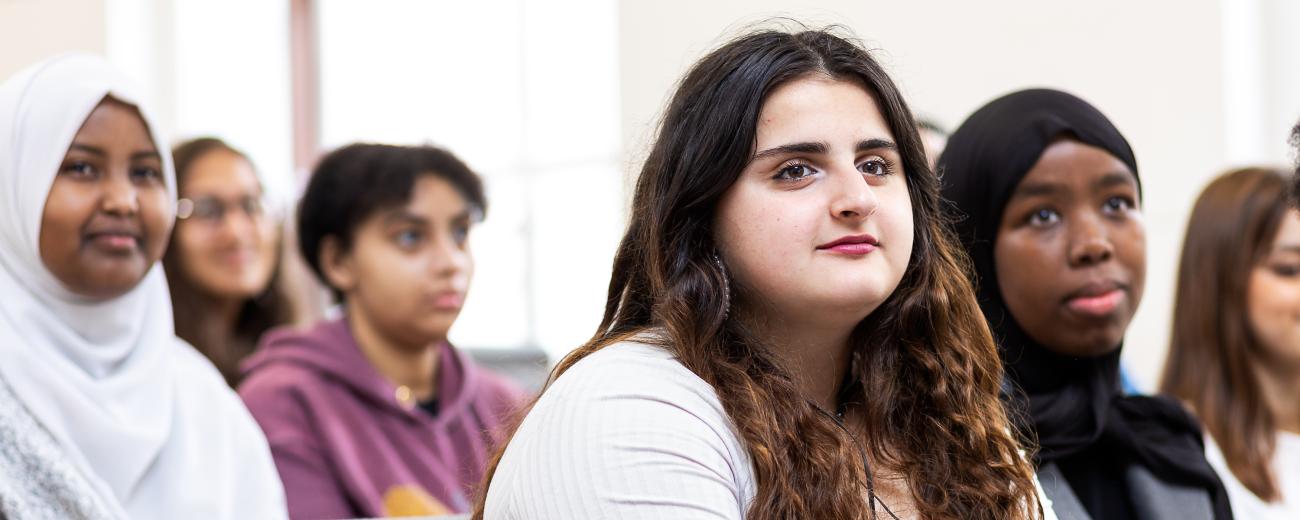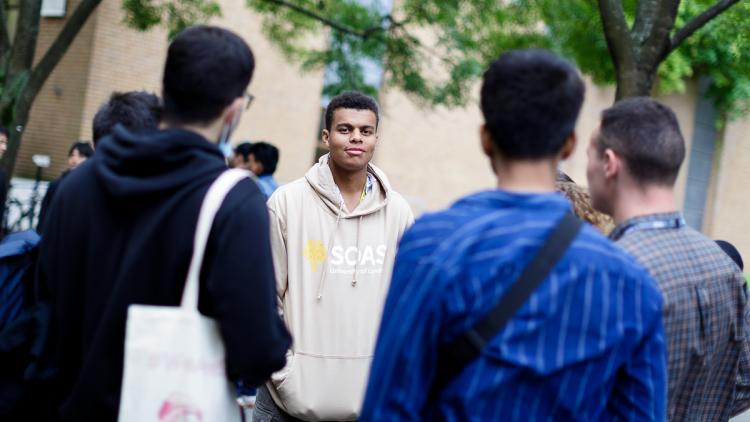Access to English Academic Studies


Key information
- Start date
- Duration
- 13 weeks (11 weeks, plus 2-week assessment period from 24 April to 21 July 2023).
- Start of programme
- April
- Attendance mode
- Part-time, online learning
- Fees
-
£2,650
- Entry requirements
-
IELTS for UKVI 5.0 overall with at least 4.5 in each subscore. Pearson Academic UKVI : 50 overall with at least 45 in each subscore
Course overview
The Access to English Academic Studies is an online programme designed to offer international students 11-weeks of extensive academic English classes in preparation for further study within SOAS and its international partnerships.
The programme is also suitable for students with an intermediate level of English who would like to develop their language and study skills for future academic study in an English-medium university environment.
It offers students the chance to develop and strengthen their English language skills within a higher education setting, with a focus on speaking, writing, and study skills. Students receive regular feedback and there is the opportunity for further guided self-study for those students who wish to study beyond the basic course hours.
Completion of this programme with at least 55% overall and 50% in each of the four skills, and a minimum of 80% attendance will guarantee progression to the ELAS Programme at SOAS without the need to retake a SELT exam.
The Access to English Academic Studies can be used to progress to a number of programmes at SOAS:
- Pre-sessional English Courses (4-week pre-sessional course)
- English Language and Academic Studies (ELAS)
- Pre-Master's Foundation (FDPS)
- International Foundation Programme (ICC)
Structure
- Programme length: 11 weeks, plus 2-week assessment period
- Time required per week: 4 hours minimum
- Minimum attendance required: 80%
This is a part-time, non-credit bearing course, consisting of live online classes and preparation tasks totalling four hours per week. Live classes are taught in the morning UK time between 8 AM and 12 PM BST (British Summer Time).
The emphasis of the programme is on the development of English for Academic Purposes within a context that simulates the students’ higher education experience. This is achieved by integrating Academic English instruction with a series of academic subject lectures looking at belief, civil society, governance, and economics within the theme of ‘Changing World Views’.
The contents of these lectures is used as the base of the materials and assessments within the academic English side of the programme; and the academic subject lectures’ discussion, case study and reflection sessions and tasks give students the opportunity to activate the skills introduced during the academic English sessions.
A key feature of the programme is the individualised guidance given through written and live one-to-one tutorials. This is based on the completion of set short tasks and live session performance and not only provides feedback but also highlights areas for development.
During these tutorials an agreed action plan with supplementary self-study exercises will be created for those students who wish to study beyond the basic course hours. Please note the completion of the set tasks (around 30 minutes) as well as attending the tutorials (10-20 minutes) are in addition to the eight core hours given above.
Programme assessment
Students are assessed through the completion of a series of five short tasks; a timed writing practice which is reviewed and then re-written; their performance throughout the academic subject sessions.
There will also be a two-week assessment period which includes:
- Academic English listening assessment (a comprehension task) based on the fifth concluding academic subject lecture
- Academic English speaking assessment (a collaborative poster presentation) based on one aspect of the lecture series theme
- Academic English Writing assessment (a 500-800 word essay) based on the lecture series theme
If you require more information, please contact: epts@soas.ac.uk
SOAS reserves the right to alter programme content without notice.
Important notice
The information on the website reflects the intended programme structure against the given academic session. The modules are indicative options of the content students can expect and are/have been previously taught as part of these programmes.
However, this information is published a long time in advance of enrolment and module content and availability is subject to change.
Teaching and learning
Course outline
| Week | Activity |
|---|---|
| 1 & 2 | Academic English: Introduction to academic English and grammatical review Task 1 with feedback; individual tutorial resulting in an agreed action plan for guided self-study |
| 3 | Academic Subject lecture one: Introduction to the series of lectures and changes in economic growth. Discussion, case study, and reflection |
| 4 | Academic English: Focus on reading skills, referencing & summarising Task 2 with feedback and reflection |
| 5 | Academic Subject lecture two: Changes in governance and politics Discussion, case study, and reflection |
| 6 | Academic English: Focus on speaking skills through developing an argument Task 3 with feedback and reflection ; review of guided self-study action plan. |
| 7 | Academic Subject lecture three: Civil engagement Discussion, case study, and reflection |
| 8 | Academic English: Focus on writing skills through developing an essay Task 4 with feedback and reflection |
| 9 | Academic subject lecture four: The implications of the rift between science and religion. * Student generated (Task 5) |
| 10 & 11 | Bringing everything together and remedial academic English development Further action plan with guided self-study tasks and an individual tutorial |
| 12 & 13 | Assessment Weeks |
Fees and funding
Fees
£2,650
How to pay
1. Online with a credit or debit card
- Go to SOAS online payments
This is the most efficient way to pay and will mean we can process your paperwork quicker. We accept Visa, Mastercard, Eurocard, Switch, Maestro, Solo and Delta. You need your student ID/reference number and you will be able to make as many payments as is necessary to pay your fees.. After you have made a payment, you will be given a receipt.
2. By bank transfer
Payment of fees at banks must only be made via a bank transfer (that is, from your account into the School's bank account). Please do not deposit money directly into the School's account.
Important note: A bank transfer fee is often charged by both the sending and receiving banks, so you must pay these independently of you course fee. If not, the actual amount received by SOAS will be less than the course fee. If funds are received without bank transfer fees being paid this will lead to delays in processing your application documents.
Please ask your bank to provide you with a Remittance Slip or proof of transaction, and be sure they quote your full name and your 6 digit ID number.
School's account details
- Natwest Bank plc, 94 Moorgate, London, EC2M 6XT
- Account number: 08622655
- Sort code: 56-00-23
- Account holder: School of Oriental and African Studies (SOAS)
- Swift number: NWBKGB2L
- IBAN: GB77NWBK56002308622655 (International Bank Account Number)
3. At enrolment
If you have not paid your tuition fees before arriving in the UK you can do so on the enrolment day, but as this is a very busy time you may have to wait in line to do so. Please try to pay before you arrive.
4. If you are sponsored by a funding or government body
You should email ifcels@soas.ac.uk with proof that your tuition fees will be paid and with contact details of the funding body. If the sponsorship is not confirmed before the start of the academic year then please bring that information with you to enrolment. Please note that if your sponsor does not pay, you are responsible for paying your tuition fees.
Additional costs
- Accommodation
- You may be required to purchase books for some modules. Students taking the World Art and Literature module may be required to pay for some gallery visits where there is an entrance charge.
Please see the full Terms and Conditions.
SOAS reserves the right to alter programme content and fees without notice.

